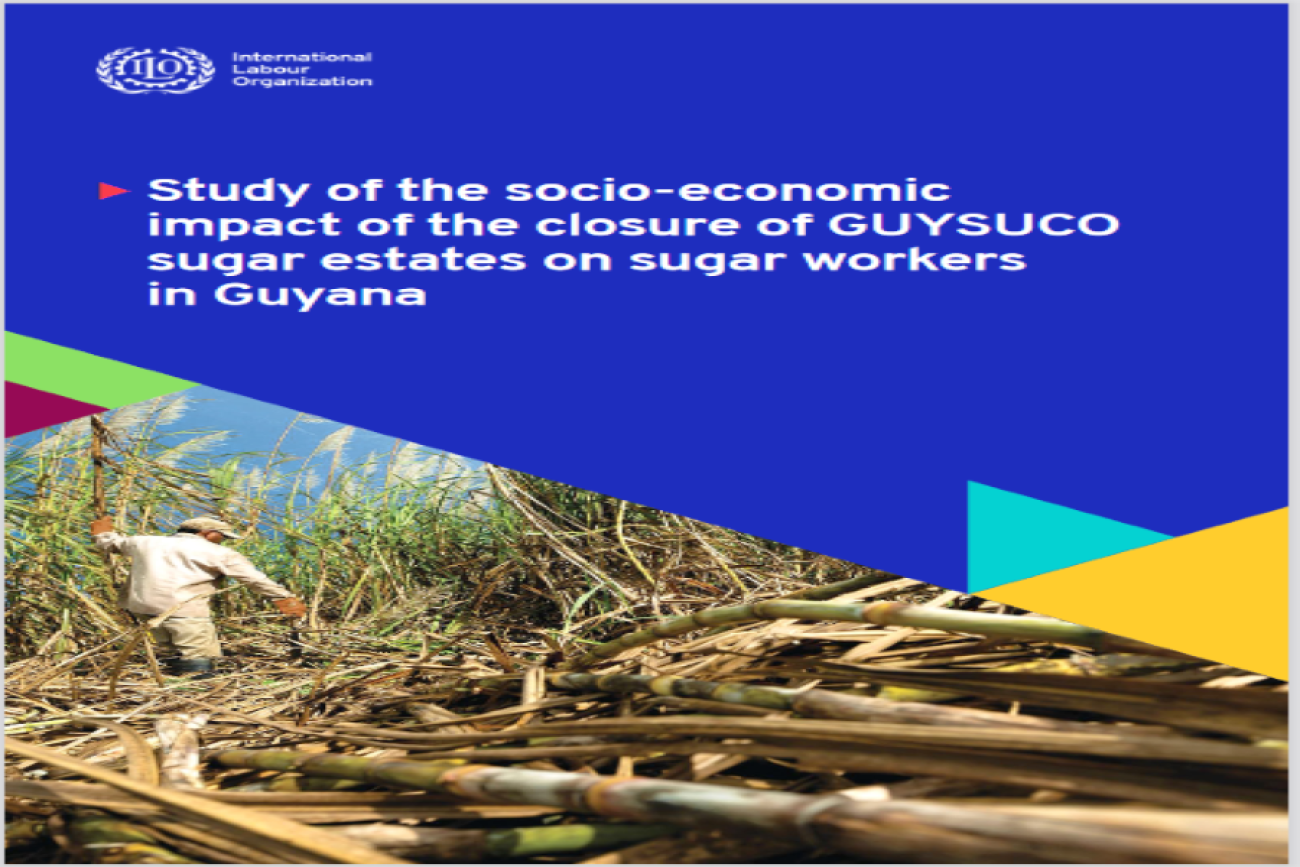Guyana launches Study of the socio-economic impact of the closure of GUYSUCO sugar estates on workers

The International Labour Organization (ILO) funded a Study on the closure of four estates of The Guyana Sugar Corporation (GUYSUCO).
The Study explores the magnitude of the shutdown on income generation and earning activities for workers and recommends options for an effective revitalization of the sector and employment.
Officially launched on 10 June during a high-level virtual ceremony hosted by the ILO, the Study of the socio-economic impact of the closure of GUYSUCO sugar estates on sugar workers serves as a response to the situation through a “sustainable livelihoods” framework and takes into consideration social safety and support instruments provided by the Government after the halt in production.
“The Study is an undertaking in response to a collective request from the tripartite partners in Guyana to the ILO to not only highlight the socio-economic consequences of the closure of the sugar estates but also to provide information to help with their decision-making to design programmes that mitigate the consequences for affected workers. I therefore hope as we launch this report that we have succeeded to meet this need,” said Dennis Zulu, Director of the ILO Decent Work Team and Office for the Caribbean, during his opening remarks.
At the time of the 2016 – 2017 closing of the Wales, East Demerara, Rose Hall and Skeldon sugar estates, GUYSUCO was the largest employer in the country with a staff of 16,000 and around 160,000 people (one fifth of the population) indirectly dependent on its operations. However sugar, largely produced for an export market, often struggled to garner sufficient demand and maintain competitiveness in global markets. The drastic decline in exports from USD123 million in 2011 to USD49 million in 2017 and USD27.7 million in 2019 reflect the challenges faced by the state-owned sugar industry, managed by GUYSUCO.
“The Study offers many lessons for policymaking and implementation in economic diversification and social services. It underlines the importance of stakeholder consultation and engagement in decision-making. I hope that it can inform decisions on the future of the sugar industry and the broader food industry,” said Mikiko Tanaka, United Nations Resident Coordinator for the Co-operative Republic of Guyana. “Food systems is an area of economic transformation that holds high potential for Guyana’s Sustainable Development Goal pathway. As the UN system and the Government jointly strategize its future cooperation in Guyana, we will closely examine how we can support the development of the food value chain in a way that generates decent work and leaves no one behind.”
Research conducted through the Study found that the livelihoods of sugar workers who were laid off were severely compromised. Concerns faced by workers included feelings that they were too advanced in age to be considered by new employers (especially in the context of wider unemployment in the country), children still at school, and the ability to use skills outside of GUYSUCO.
The Honourable Ashni Singh, Senior Minister in the Office of the President with responsibility for Finance spoke at the event on behalf of His Excellency Dr Mohamed Irfaan Ali, President of the Co-operative Republic of Guyana. During his feature remarks, he quoted from the Study to illustrate the depth of the damages caused by the cease in operations.
“GUYSUCO was however more than the estates of which it was comprised. Beyond the national significance of the company as an aggregate of its various operations and estates, and beyond the significance of each estate for the workers and immediate communities that were directly connected with it, was the significance of each estate to a sub-regional economy and even a subsection of society that developed around that estate,” stated Minister Singh.
Dr. Thomas B. Singh, Director of the GREEN Institute of the University of Guyana and author of the Study provided guidance for restoring the profitability of the sugar industry and the livelihoods of workers. Most notably, he recommended complementary investments in cellulosic ethanol production using sugar cane to advance green economy policies that promote sustainable and inclusive growth and commitments to the Paris Climate Agreement.
“This will add renewable energy as a major component of Guyana’s energy portfolio, creating jobs. It will secure technology transfer and local content from major oil companies engaged in advanced biofuel research to provide skills for cellulosic ethanol production so that Guyana can reduce carbon emissions even as it becomes a major oil producer,” explained Dr Singh.
President of the Guyana Agricultural and General Workers’ Union (GAWU) Seepaul Narine noted the value of the research to find collective solutions. “The Report covers a range of issues and sought a comprehensive examination and more importantly the effects of estate closures. It points to several possibilities for the industry’s long-term viability. We are hopeful that GUYSUCO and our policymakers sincerely consider them,” he said during his speech.
The Study of the socio-economic impact of the closure of GUYSUCO sugar estates on sugar workers was made possible through the ILO Caribbean Resilience Project, a two-year programme of targeted technical assistance for a just transition to environmentally sustainable economies in the context of climate change adaptation. For more information about the Project, visit: https://www.ilo.org/caribbean/projects/WCMS_714015/lang--en/index.htm.
The ILO is committed to continuing to support trade unions in Guyana, including capacity building for digitalization skills so that they can emerge from the COVID-19 pandemic prepared for more innovative and sustainable labour markets. The support will be provided through the framework of the current Decent Work Country Programme (DWCP) and beyond.

